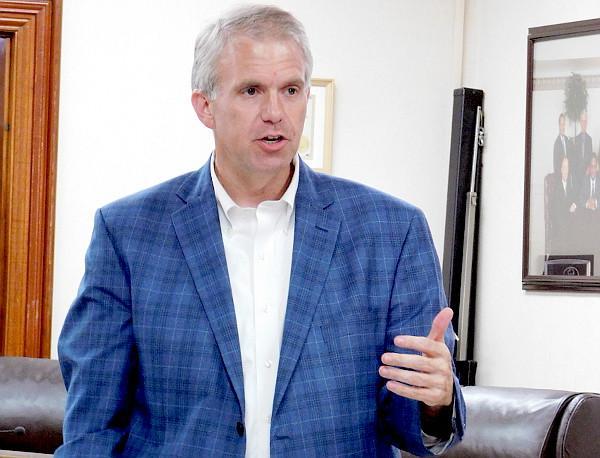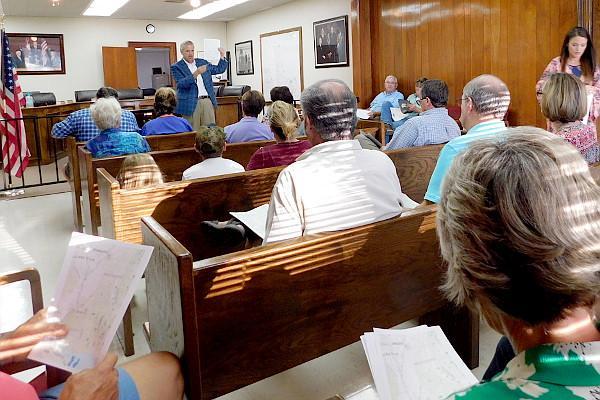
Photo by Sue WatsonBrandon Presley talks about bad cell phone service in certain areas.

Photo by Sue WatsonBrandon Presley (background) urges citizens to conduct cell phone connectivity studies at the local level.
Rural Mississippi in ‘digital dark’
Public Service Commissioner Brandon Presley is on a mission to determine the real story of connectivity of iPhones in the 33 counties he serves.
He held a call-to-action meeting in Holly Springs Thursday that was attended by about 30 people interested in improving cell phone connectivity and high speed Internet service in Mississippi.
He is calling on volunteers to use a free application to conduct a connectivity study at the local level across his entire district.
Rural areas, in particular, do not have the connectivity for iPhones and therefore many customers are experiencing spotty coverage and lots of dropped calls.
Mississippi ranks 49th in most-connected states in rural areas. The statewide download speed to the Internet in Mississippi is 25.2 Mbps.
While about 90 percent of wire-line customers have coverage to broadband, only about 7 percent have fiber-optic service.
The top download speed city in the state is Clinton at 117 Mbps.
He’s on a mission to accurately assess cell phone coverage and high speed Internet service.
About 20 people in Marshall County have signed up to participate in the FCC Speed Test Application. Presley wants as many people as he can get in each county to participate.
FCC put out a colored map in the spring that may not show the true picture of cell phone coverage in the rural telecommunication towers in the state. Individuals living in adequate coverage areas are shown in blue. The FCC carriers provided coverage information for the map.
One carrier overstated its coverage, Presley said.
The map, however, is important, because it will determine funding in future years and some new towers may be turned down due to lack of coverage, he said.
“You and I know this map is wrong,” Presley said. “You wouldn’t be here if coverage with Verizon was good. We want volunteers to prove this map is wrong; where, in fact, FCC is wrong.
“We want maps to say we have a problem in Laws Hill. We can challenge FCC when people do not have a signal.
“If you pay a cell phone bill, you should be able to use your phone.”
Presley said his office is discovering areas where there is no iPhone service.
“We find latitudes and longitudes that do not show errors,” he said.
Volunteers will use their iPhones to run a speed test.
“Use your own information,” he said. “You know where your phone does not work. The more tests we have on as many phones as you can, as often as you can, the better.”
Volunteers should take as many tests as they can run in as many areas they can run before November 15. Choose areas known to give spotty or weak service. Record the results over the same areas often at different times of the day.
Presley’s office and website will provide all the information a person needs to participate in this important survey.
The FCC Speed Test App saves all information it gathers.
Why?
“This is an effort to try to upend something the federal government has put out (the map),” Presley said. “Twelve hundred people have contacted us with no service or bad service. You can ask other people to test, too.”
To volunteer, a person must provide their name, address, a phone number and an email to Presley’s office. They are asked to report on areas where there is no service or substandard cell phone service.
Volunteers can run the test app in any county in Mississippi.
The reason the test is needed is that some towers report 4G but customers only get 2G.
“We can’t afford mercenaries, so we need missionaries,” Presley quipped.
The Internet service test will tell whether a consumer is lied to at the point of sale of a phone. They then cannot get service at their home. Or, some consumers may buy a phone, get service for awhile, then not have any service, especially if they upgrade their phone, said Greg Campbell.
“People are saying this all over,” Presley said.
This dwindling of service may be associated with an increase in traffic or usage in a specific area that is draining the bandwidth, Presley said.
“I can tell you places I have gone to that had service and now have no service,” he said.
High-speed Internet
High-speed Internet service is “the electricity of the modern world,” Presley said. “Some people can’t move up or get promoted because they get bad service in their area. It’s a shame and disgrace.”
“Rural Mississippi today is in the digital dark. We’ve got a mess,” he said.
It is a cause of population loss in the state the last three consecutive years, he said. Young people are leaving Mississippi at a faster rate than anywhere in America. Grandmothers say their grandchildren won’t come to visit because they won’t be able to get on the Internet.
And demand for bandwidth is only increasing, so service is only going to get slower.
“What modern Mississippi needs is fiber to the home,” Presley said.
A state law, if changed, would allow electric power providers to provide Internet service over their infrastructure (power poles). But an old antiquated law that says they can only provide power must be changed. Presley said Mississippians should step up to get this law changed so electricity providers can offer Internet connectivity over their system.
It is being done in Tennessee, Alabama, Arkansas and other places in the country, he said.
“Drive through and look at the stores closed,” Presley said. “Our Number 1 priority is high-speed Internet in rural areas. It is essential to be able to participate in modern life. In many ways, the future you live in is on the line. The future is limitless if you have this in your house. You will be able to work from home over the Internet, video conference. Five hundred thousand jobs will be created in rural communities to work at home.”
People will be able to go to school online, with high-speed Internet. Modern telemedicine will permit hospitals like M.D. Anderson to send prescriptive medicines to treat cancer at their local hospitals. Sick people can stay home and lots of stress will be alleviated because travel will not be required.
This is already happening in rural Alabama, Presley said.
He said this issue is the most important he’s ever worked on in his political life.
To contact Presley for further information on how to volunteer in the FCC Speed Test, email Presley at taskforce@psc.state.ms.us. If you have other questions, contact Keisha McDaniel at 601-961-5467 or email McDaniel at lakeisha.mcdaniel@psc.state.ms.us.
They will help you sign up and provide information needed to conduct the FCC Speed Test and to report the test results to the Public Service Commission.
The sooner you get started, the more tests you can conduct for this important project.

